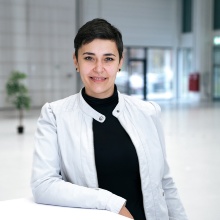1. Please briefly introduce yourself and your current job.
My name is Brigitte Schönberger and I have been working as a postdoc at the Institute for Entrepreneurship and Innovation Science since November 2022. My task is to establish a course in the "IKILeUS" project together with the ISTE, which is intended to familiarise students of all disciplines with the black-box concept of "artificial intelligence". In this course (AI Prototyping 101: From Idea to Reality), an everyday problem is creatively solved with the help of A.I. tools. In the process, we guide students from idea to product or in the development of a software and/or hardware prototype to solve the given problem. I also deal with the construction of experimental spaces for idea development and implementation and investigate their effect.
2. How did you get involved in innovation/creativity?
I am not a subject specialist. I actually come from the life sciences and then switched to education. Through this lateral entry, I quickly learned how valuable it is to include different perspectives from diverse disciplines and realities in problems - especially in research. Allowing changes of perspective promotes (my) creative thinking. As a mentor at the Design Factory, I got to know and love other creativity methods, so the switch to innovation and creativity research seemed logical to me. Exploring the subject area awakens my desire to allow, develop and implement ideas - it's just fun, which I would like to share (with students).
3. Do you have any advice for students who are not sure about their study decision?
My choice of study (agricultural biology) was not particularly well thought out. As a first-generation student (students from non-academic families), I had little idea what to expect at university or what my choice of study meant. So without much thought, I simply followed my intuition. I have kept this in mind until today. My tip is therefore: Your choice of study does not necessarily determine your career. Do what feels right, make a decision and see what comes out of it. In our world, change is almost always possible. This thought helps you stay open to new things.
Contact

Melanie Minderjahn
Career Service - Inner Development, Public Relations


